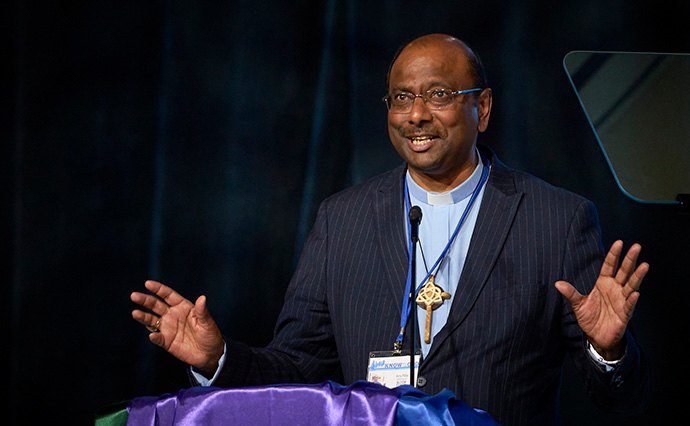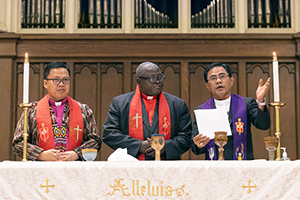Key points:
- The United Methodist Church approved full communion with The Episcopal Church, leaving a similar move by the Episcopalians needed to clinch the deal.
- Retired Bishop Sally Dyck, the ecumenical officer of the Council of Bishops, said another ecumenical relationship also deepened, this one with the Moravian Church.
- The Rev. Jerry Pillay, general secretary of the World Council of Churches, delivered the sermon during morning worship centered on the day’s ecumenical theme.
Delegates to the United Methodist General Conference approved full communion with The Episcopal Church on April 30. The agreement needs the approval of the Episcopalians before going into effect.
During the conference’s “Ecumenical Day,” the morning plenary session was halted briefly to acknowledge the vote.
“We want to lift up and recognize this moment, which is an incredibly significant moment, especially on this day as we celebrate our ecumenical relations,” said the Rev. Gary Graves, secretary of the General Conference.
“As you adopted that resolution,” he noted, “you adopted the full communion relationship with The Episcopal Church in the United States, that has been worked on for many years.”
Presiding over the plenary, Bishop Lanette Plambeck said, “That feels pretty good, doesn’t it?” She serves the Dakotas-Minnesota Episcopal Area. “What a beautiful moment this is for our connectional relationship, our ecumenical relationship and our witness to the world.”

The resolution was on the day’s consent calendar, which allows the lawmaking assembly to approve multiple pieces of legislation in bulk. To make it onto the consent calendar, petitions must receive no more than 10 “no” votes in legislative committee and have no implications for the denomination’s budget or constitution.
If The Episcopal Church affirms the agreement, which might not happen until meetings scheduled for 2027, it will mean that the two denominations recognize each other as “one, holy, catholic and apostolic church in which the Gospel is rightly preached and taught.”
Subscribe to our
e-newsletter
“We’re excited,” said retired Bishop Sally Dyck, the ecumenical officer of the Council of Bishops. “A lot of people have been working on it for a long time.”
One practical benefit of full communion would be that pastors could serve in the churches of the other denomination. In a time when some rural and even urban communities have no Christian churches, there would be an opportunity for a joining of forces as a remedy, Dyck said.
“Once we make that full communion, then all of us have full communion with each other — the Episcopalians, the Lutherans, the Moravians and us,” she said. “Then we don’t have to have all these individual coordinating (joint) committees. We could all be one coordinating committee, perhaps, that would be cheaper and far more creative and interactive.”
Communion would also mean that United Methodists and Episcopalians would recognize the authenticity of each other’s baptism and Eucharist; extend sacramental hospitality to one another’s members; recognize ordination of each other’s priests, elders and deacons; report regularly to one another; formulate joint educational materials and encourage continuing education opportunities for lay and clergy leaders regarding full communion; and agree to cultivate and maintain active partnership and consultation with each other.
On April 29, another ecumenical relationship deepened, this one with the Moravian Church, Dyck said earlier in the plenary.
“The General Conference approved a new, full communal relationship between our church and the northern and southern provinces of the Moravian Church,” Dyck announced.
“It’s natural that we now find ourselves coming closer together,” she said. “The Moravians were a shining example to John and Charles Wesley of the possibilities of freedom through God’s grace.”

General Conference photos
The Rev. Neil Routh, president of the Provincial Elders’ Conference of the Moravian Church, Southern Province, said the ties between the two denominations “are deep.”
“It is natural that we now find ourselves coming closer together,” Routh said. “We Moravians give thanks that we are joined together as one family with our siblings in The United Methodist Church.”
The Rev. Jerry Pillay, a South African pastor in the Uniting Presbyterian Church who serves as general secretary of the World Council of Churches, delivered a sermon during morning worship keeping with the ecumenical theme.
Pillay described the world as having “multiple threats,” such as accelerating climate change, COVID-19, injustice, poverty, disease, conflicts and wars.
“We need to listen afresh to what God is calling us to do,” Pillay said. “We need to listen to the voice of God in the midst of all the raging voices, crying for our attention and staking its claim.”
He repeated the phrase “Christian unity matters” several times, and got the audience to chant it as well.
Humility and gentleness can help Christians be unified, along with “the spirit in which we listen to each other,” he said.
“Admittedly, every family has its challenges with disagreements,” Pillay said. “The church is no different. Therefore, at all cost, we must make every effort to keep the unity of the servant through the bonds of peace.”
Patterson is a UM News reporter in Nashville, Tennessee. Contact him at 615-742-5470 or newsdesk@umcom.org. To read more United Methodist news, subscribe to the free Daily or Weekly Digests.



